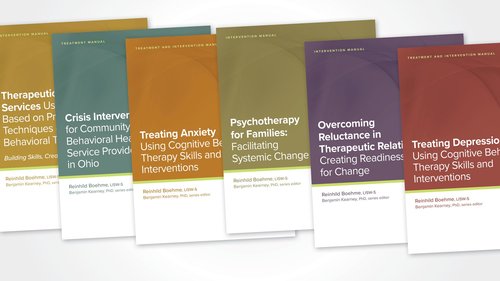
Cognitive Behavioral Therapy (CBT) Plus is a treatment modality sensitive to our clients’ experiences. As an approach, CBT Plus can be used in any setting and by any practitioner that utilizes CBT. But it is especially helpful for those who serve clients suffering the effects of marginalization and discrimination.
In its many forms, CBT long has been the gold standard of evidence-based treatments for a variety of mental disorders. In short, CBT asserts that our thoughts, feelings, and behaviors interact in ways that can contribute to our psychological well-being or move us towards mental distress and mental illness.
Intuitively, this makes sense. When we think of ourselves as miserable, unworthy, and incompetent, we are more likely to feel miserable, unworthy, and incompetent. And when we feel this way, we may be less likely to engage in behaviors that make us feel better. Instead, we may struggle to connect with friends, engage in meaningful work, or even get ourselves out of bed and out of the house.
More external issues also are behind anxiety, depression, and trauma- and stress-related illnesses. Real-world problems impact our development over the lifespan and both our physical and mental health. Poverty, for instance, is stressful, and you can’t think your way out of it. Likewise, marginalization, racism, and other forms of discrimination are stressful.
The science of trauma and toxic stress tells us that our biology is affected by these conditions. When we experience long periods of toxic, overwhelming stress from which we cannot escape, our bodies produce high levels of stress hormones. Over time, this can damage our bodies and lead to illnesses such as diabetes, high blood pressure, and heart disease, as well as depression, anxiety, and stress-related disorders. Our physical and mental well-being is contextual and interactional. I.e., our thoughts, feelings, and behaviors interact with our contexts, and our contexts interact with our bodies and brains.
Because of this, we need to change the language of CBT to acknowledge the impact of conditions of toxic stress, such as poverty, marginalization, and discrimination. If we don’t, we run the risk of implicitly blaming our clients for their psychological symptoms. Our clients are not simply suffering from anxiety because they employ faulty thinking. They are anxious because they may lose their housing, don’t know where their next meal will come from, and are afraid of being targeted due to their real or perceived status of belonging to a marginalized group.
The science of interpersonal neurobiology also tells us that relationships impact our biology. We are better, both psychologically and physically, when we are connected with family – biological or chosen – and friends. In the company of those who love us and those who support us, we develop resilience. The therapeutic relationship is a relationship, after all, not just a vehicle for changing the thoughts of our clients. Our clients perceive us to be safe or not based on their prior experiences, including intergenerational and historical trauma.
Traditional CBT has a tendency to value content over relationship. CBT Plus, on the other hand, asserts that relationship is at the core of change. Caring therapeutic relationships acknowledge our clients’ contexts of marginalization and discrimination and the impact of these contexts on our clients’ well-being, as well as the interpersonal barriers built by privilege that may impact therapeutic relationships. Such relationships don’t take our clients’ trust in us for granted but rather recognize that trust must be built.
CBT Plus takes traditional CBT and transforms it. CBT Plus is a science-informed, trauma- and toxic stress-informed, contextual, and culturally and linguistically sensitive treatment modality. As a new way of approaching CBT, rather than a specific treatment protocol, CBT Plus changes our lens to be inclusive of client contexts and attuned to client experiences of marginalization and discrimination. It tells us to really listen to our clients’ experiences. And for this reason, it is much more likely to help them move forward.
Our clients are not flawed, unmotivated, or struggling with faulty thinking. Their contexts of poverty and toxic stress, fueled by marginalization and discrimination, have hurt them and their communities physically, psychologically, and spiritually. It is up to us, therefore, to give our clients the best treatment possible for their individual needs and contexts. CBT Plus is a tool that allows us to offer that to them.
See how CBT Plus works first-hand by browsing examples in our monthly Intervention Spotlight. In this section, we share interventions directly from our clinical manuals.
Our manuals incorporate the principles of CBT Plus. They offer a range of strategies and interventions designed for specific treatment contexts and goals. We also offer in-person training on how to utilize CBT Plus and other innovations we’ve developed. Visit our online shop for more products.






